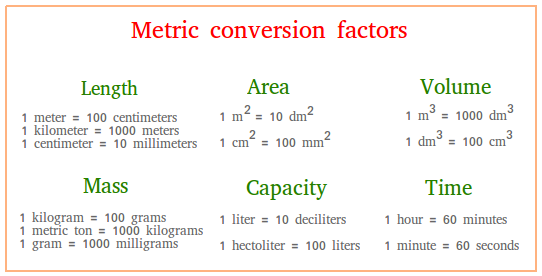Metric Conversion Factors
The metric system is a standardized system of measurement used globally, renowned for its simplicity and scalability. It is based on units of ten, making conversions straightforward. Understanding metric conversion factors is essential for various applications, from everyday tasks to scientific research.
This lesson provides a concise yet comprehensive list of metric conversion factors across different measurement categories. By the end of this lesson, you'll be proficient in converting between metric units with ease.
1. Length in the Metric System of Measurement
Length is one of the most fundamental measurements in both daily life and scientific contexts. The metric system simplifies length measurements using base units and prefixes that denote multiples or fractions of these units.
| Unit | Symbol | Equivalent |
|---|---|---|
| Kilometer | km | 1 km = 1,000 meters (m) |
| Hectometer | hm | 1 hm = 100 meters (m) |
| Decameter | dam | 1 dam = 10 meters (m) |
| Meter | m | Base unit for length |
| Decimeter | dm | 1 dm = 0.1 meters (m) |
| Centimeter | cm | 1 cm = 0.01 meters (m) |
| Millimeter | mm | 1 mm = 0.001 meters (m) |
Understanding the Prefixes
- Kilo- (k): Multiplies the base unit by 1,000.
- Hecto- (h): Multiplies the base unit by 100.
- Deca- (da): Multiplies the base unit by 10.
- Deci- (d): Divides the base unit by 10.
- Centi- (c): Divides the base unit by 100.
- Milli- (m): Divides the base unit by 1,000.
Practical Examples
1. Converting Kilometers to Meters:
- Problem: How many meters are in 5 kilometers?
Solution:
- Answer: 5,000 meters
2. Converting Centimeters to Meters:
- Problem: Convert 250 centimeters to meters?
Solution:
- Answer: 2.5 meters
2. Area in the Metric System of Measurement
Area quantifies the extent of a two-dimensional surface. Metric area units are based on square measurements.
| Unit | Symbol | Equivalent |
|---|---|---|
| Square Meter | m² | Base unit for area |
| Square Decimeter | dm² | 1 m² = 100 dm² |
| Square Centimeter | cm² | 1 m² = 10,000 cm² |
| Square Millimeter | mm² | 1 m² = 1,000,000 mm² |
| Hectare | ha | 1 ha = 10,000 m² |
Understanding the Prefixes
- Hectare (ha): Commonly used in measuring land areas.
- Square Decimeter (dm²): Useful for smaller area measurements.
- Square Centimeter (cm²): Often used in technical and engineering contexts.
- Square Millimeter (mm²): Employed in precision measurements.
Practical Examples
1. Converting Kilometers to Meters:
- Problem: How many meters are in 5 kilometers?
Solution:
- Answer: 5 hectares
2. Converting Square Centimeters to Square Meters:
- Problem: How many meters are in 5 kilometers?
Solution:
- Answer: 0.05 square meters
3. Volume in the Metric System of Measurement
Volume measures the space an object occupies. In the metric system, volume is typically expressed in cubic units.
| Unit | Symbol | Equivalent |
|---|---|---|
| Cubic Meter | m³ | Base unit for volume |
| Cubic Decimeter | dm³ | 1 m³ = 1,000 dm³ |
| Cubic Centimeter | cm³ | 1 m³ = 1,000,000 cm³ |
| Cubic Millimeter | mm³ | 1 m³ = 1,000,000,000 mm³ |
Understanding the Prefixes
- Cubic Decimeter (dm³): Equivalent to a liter (L).
- Cubic Centimeter (cm³): Also equivalent to a milliliter (mL).
- Cubic Millimeter (mm³): Used in highly precise measurements, such as in engineering.
Practical Examples
1. Converting Cubic Meters to Cubic Centimeters:
- Problem: How many cubic centimeters are in 2 cubic meters?
Solution:
- Answer: 2,000,000 cubic centimeters
2. Converting Liters to Cubic Decimeters:
- Problem: Convert 3 liters to cubic decimeters.
Solution: 3 L = 3 dm3
- Answer: 3 cubic decimeters
More Metric Conversion Factors
Capacity in the metric system of measurement:1000 liters or 1000 L = 1 Kiloliter or 1 kL
1000 milliliters or 1000 mL = 1 liter or 1 L
Mass in the metric system of measurement:
1 kilogram or 1 kg = 1000 grams or 1000 g
1000 kilograms or 1000 kg = 1 metric ton or 1 t
1000 milligrams or 1 mg = 1 gram or 1 g
Time in the metric system of measurement:
60 seconds or 60 sec = 1 minute or 1 min
60 minutes or 60 min = 1 hour or 1 hr
24 hours or 24 hr = 1 day
365 days = 1 year
Temperature Degrees Celsius(°C)
0°C = freezing point of water
37°C = normal body temperature
100°C = boiling point of water
A Figure Summarizing the Metric Conversion Factors
